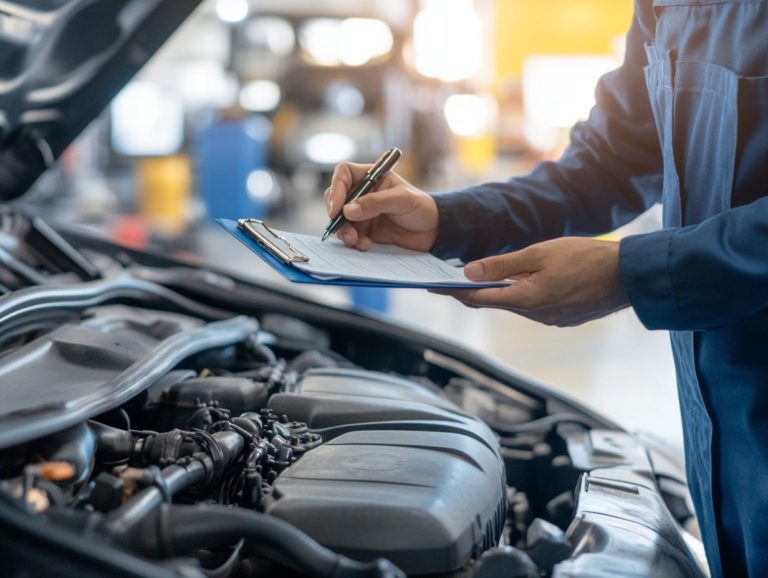What to Do if Your Warranty Expires?
Did you know that warranties provide a safety net for your purchases? They often grant you peace of mind. However, as time goes on and warranties begin to expire, you may find yourself uncertain about your options.
This article breaks down the various types of warranties, detailing what they cover and what happens when they expire. It also examines the pros and cons of extending your warranty, managing repairs on your own, and investing in an extended service plan.
It highlights important factors for you to consider before making any decisions, so you remain well-informed and confident in your choices.
Contents
Key Takeaways:

- Consider the cost and benefits before renewing or extending your warranty, as it may not always be worth it.
- Explore self-maintenance and repairs to save money after your warranty expires, but be sure to follow proper guidelines.
- Research the reliability and age of your product, as well as the manufacturer’s reputation and customer reviews, before deciding on extending your warranty or purchasing an extended service plan.
Understanding Warranties
Understanding warranties is vital for you as a vehicle owner, especially given the significant costs tied to repairs and maintenance. A car warranty serves as a protective shield for your investment, covering a range of services, including repairs, parts, and labor.
Opting for extended warranty options can further bolster this protection, ensuring you remain shielded beyond the original manufacturer warranty period, which usually has a set timeframe or mileage limit. It’s essential for you to grasp the differences between warranty types, such as factory warranties and extended warranties, to make informed decisions about your vehicle’s future.
Types of Warranties
There are several types of warranties available for vehicles, each tailored to meet your unique needs. A manufacturer warranty typically comes with new cars, covering defects and necessary repairs for a limited time, while a factory warranty offers similar protections. Extended warranties, like bumper-to-bumper and powertrain warranties, provide additional coverage beyond the original terms, ensuring you re shielded from unexpected vehicle costs as time goes on.
These warranties vary in scope and duration. For example, a bumper-to-bumper warranty covers nearly all components of your vehicle, excluding wear-and-tear items, granting you peace of mind if you seek maximum coverage. On the other hand, a powertrain warranty focuses specifically on critical components like the engine and transmission, making it particularly valuable for those who drive extensively.
You can usually purchase extended warranties up until a certain mileage or age, offering flexibility if you wish to extend your coverage options. Understanding these variations empowers you to select the warranty that best aligns with your driving habits and financial situation.
What is Covered and What is Not
Understanding what your warranty covers and what it doesn t is crucial for avoiding unwelcome repair bills and disputes with your service department. Typically, warranty coverage includes essential vehicle repairs and certain parts, but some repairs may not be covered, especially those stemming from modifications that could void the warranty.
By reviewing the warranty conditions and keeping meticulous maintenance records, you can ensure compliance with the requirements set by the manufacturer or warranty provider. You should also be aware that technical service bulletins (TSBs), which are alerts about common vehicle issues and fixes, can significantly influence the scope of your coverage.
Regular maintenance and maintaining detailed service records are equally vital. Many disputes arise from a lack of documentation proving that required services were performed. While warranties can cover a broad range of repair options, exclusions often include wear and tear items, accidents, or damage due to neglect. Thus, staying informed and adhering to the guidelines is essential for your peace of mind.
Options After Warranty Expires

Once your warranty expires, you might find yourself pondering your options for vehicle maintenance and repairs. Fortunately, there are several avenues available to help you maintain coverage and safeguard your investment.
Renewing or extending your warranty is a smart choice that offers peace of mind against unexpected repairs once the original warranty period concludes. Consider extended service plans for extra security.
If you prefer a hands-on approach, self-maintenance gives you the power to manage your vehicle’s upkeep in a cost-effective way, ultimately reducing future repair costs.
Renewing or Extending Warranty
Renewing or extending your warranty can be a smart choice to elevate your vehicle’s protection and reduce your financial exposure. Many manufacturers provide warranty extensions that enable you to maintain benefits, ensuring comprehensive coverage for essential components.
These extensions can prove particularly advantageous, as they often encompass repairs not included under the original warranty, covering items such as certain electrical systems and high-cost components.
As you contemplate a renewal or extension, it’s vital to look at a few important things, including the associated costs, specific coverage options, and the terms linked to the extension. Different plans may feature varying deductibles (the amount you pay out of pocket before the warranty covers the rest) and service limits (the maximum amount the warranty will cover for repairs), so grasping these nuances can help you avoid unexpected surprises later on.
Be aware that the warranty claims process may shift when moving to an extended warranty, necessitating familiarization with new guidelines and documentation requirements. Review customer testimonials to understand the reliability of the extended coverage, ensuring you make a well-informed decision that aligns with both your needs and budget.
Self-Maintenance and Repairs
Self-maintenance and repairs present a fantastic opportunity for you as a vehicle owner to save costs while taking complete control of your vehicle s upkeep, as long as you follow a proper maintenance schedule. Keeping detailed service records not only helps you manage repair expenses but also ensures that you are complying with the terms of any existing warranties.
It s essential to grasp which repairs you can undertake without voiding your warranty and to master effective vehicle maintenance.
Engaging in self-maintenance allows you to develop a deeper understanding of your vehicle s mechanics, giving you the power to make informed decisions regarding repairs and upgrades. However, this route does come with its own set of challenges, especially when you re weighing cost savings against the complexities of certain repairs.
Sticking rigorously to the maintenance schedule recommended by the manufacturer is crucial; it not only optimizes your vehicle s performance but also strengthens your position in any warranty discussions. Many repairs, like oil changes and brake pad replacements, are often straightforward and typically permitted without affecting warranty coverage.
By diligently documenting all your service activities, you can cultivate a comprehensive maintenance history, ultimately protecting your investment and extending the life of your vehicle.
Purchasing Extended Service Plans
Purchasing extended service plans is becoming a savvy choice for vehicle owners seeking that extra layer of reassurance when it comes to repair costs and service interruptions. These plans offer a variety of coverage options think roadside assistance and help with any technical issues designed to align perfectly with your unique needs and budget. By investing time in researching pricing and service contracts, you can ensure you select a plan that caters to both your vehicle s requirements and your financial landscape!
Exploring the array of extended service plans allows you to discover solutions that cover essential components. These components range from engine repairs to electronic system diagnostics. Many of these plans present flexible payment schedules, making it seamless to incorporate these costs into your monthly budget.
The added perks, such as rental car coverage and trip interruption protection, can significantly elevate the value of these plans. Ultimately, a thorough examination of different providers and their specific terms of service empowers you to secure a contract that not only addresses your immediate needs but also offers lasting peace of mind for the road ahead.
Factors to Consider Before Making a Decision

Before you decide on your vehicle’s warranty, it s essential to carry out a detailed comparison of costs and benefits. Consider the potential savings in relation to your investment in coverage.
Key factors to assess include the reliability and age of your vehicle, as well as the manufacturer’s reputation. Read customer reviews to gain valuable insights into the experiences of fellow owners, guiding you toward a well-informed decision.
Cost vs. Benefit Analysis
Conducting a cost vs. benefit analysis is essential when evaluating the financial implications of extending a warranty versus the potential repair costs you might face down the road. This means taking a close look at both the upfront costs of warranty extensions and the likelihood of needing extensive repairs as your vehicle ages.
Understanding the how to make warranty claims is crucial in this analysis, as it clarifies how to submit claims and what expenses might be covered. By examining these elements, you can better determine whether the added peace of mind from a warranty is truly worth the investment.
Factors influencing repair costs such as your vehicle’s brand, model, age, and overall condition can significantly impact the financial burden you could encounter. It’s vital to consider how wear and tear may lead to expensive repairs that might not be fully covered under a standard warranty.
The interplay between these elements underscores the importance of a thorough understanding before making any decisions that could affect your future expenses.
Reliability and Age of Product
The reliability and age of your vehicle play a pivotal role in your decisions about warranty extensions and service. A newer vehicle might not demand the same level of coverage as an older model, which might be more prone to requiring repairs.
By understanding warranty conditions and the manufacturer s reputation for reliability, you can navigate your choices more effectively, ensuring you select the best option for your unique situation.
Consider, for example, an aging vehicle that presents its own set of challenges. Wear and tear can elevate the chances of breakdowns, making comprehensive coverage increasingly attractive.
It’s essential to account for the limitations set by warranties, which can vary widely among manufacturers. Assessing how different brands manage claims and their historical reliability can offer valuable insights into what you can expect down the road.
Ultimately, being well-informed about both the current condition of your vehicle and the warranty landscape empowers you to make a more strategic choice, aligning your needs with the most suitable options available. Take the time to explore your options today and choose the plan that suits you best!
Manufacturer’s Reputation and Customer Reviews
The reputation of your vehicle’s manufacturer can significantly shape your warranty decisions. Brands renowned for their reliability typically offer superior warranty coverage and higher customer satisfaction! Don t miss out on great warranty options understand your manufacturer s reputation now!
For example, a manufacturer celebrated for its exceptional craftsmanship is likely to provide more generous warranties, reflecting their confidence in the product and a commitment to ensuring your peace of mind.
Customer reviews are very helpful. They enable you to gauge both reliability and satisfaction through the lens of firsthand experiences.
By diving into these reviews, you can uncover how well a manufacturer handles warranty claims, which can play a crucial role in keeping your rights safe as a buyer and enhance your overall ownership experience.
Such insights are essential as you navigate the intricacies of warranty options, giving you the power to make informed choices that align perfectly with your needs.
Frequently Asked Questions

What Should I Do Before My Warranty Runs Out?
Before your warranty expires, make sure to fully understand the terms and conditions. If your product has any issues, make a note of them and contact the manufacturer before the warranty period ends.
What Does It Mean When My Warranty Expires?
When your warranty expires, it means that the period of time in which the manufacturer guarantees to repair or replace your product for any defects has ended. Usually, warranties last for 1-3 years after your purchase.
Can I Still Get My Product Repaired or Replaced If My Warranty Has Expired?
Yes, you can still have your product repaired or replaced. Some manufacturers offer extended warranty options for an additional cost, or you can look into third-party warranty companies.
What If My Product Breaks After the Warranty Expires?
If your product breaks after the warranty expires, you may still have options. Check if your product is covered by a recall or if the manufacturer has a goodwill policy in place. You can also reach out to a third-party repair service.
Can I Still Return My Product If the Warranty Has Expired?
Unfortunately, most manufacturers do not allow returns after the warranty has expired. However, you may be able to return your product if it is within the store’s return policy timeframe or if you have purchased an extended warranty.
If you’re unsure about your warranty, check with your manufacturer today!






